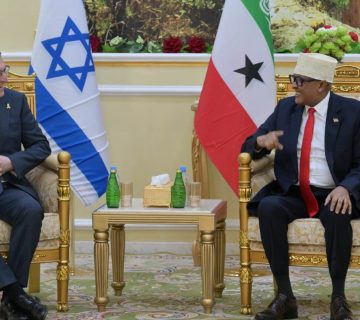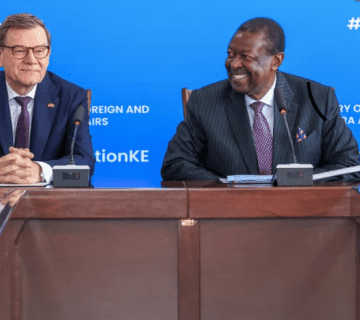Raila Odinga, a prominent Kenyan politician and former Prime Minister, is the front-runner candidate for the position of the African Union Commission. His candidacy has generated significant interest and support from various African countries, especially the Nile Basin countries including Egypt. The tensions over water sharing along the 6,600 kilometres world famous longest trans-boundary river, has featured upstream Democratic Republic of Congo (DRC), Tanzania, Kenya, Burundi, Rwanda, Uganda, Ethiopia and South Sudan on the one hand, and downstream Sudan and Egypt on the other. The former are aggrieved by colonial water treaties which entrenched the latter’s monopoly.
The Nile Conundrum
While the upstream countries have mostly endorsed the Nile Basin Initiative which begun in 1999, Sudan and Egypt have been demonstrably non-committal, leaving the upstream countries to adopt the process’ final outcome, the Comprehensive Framework Agreement despite protest from Cairo. However, it is Ethiopia’s move to construct the Grand Ethiopian Renaissance Dam (GERD) over the Blue Nile tributary to generate electricity for close to 60 percent of its population, that has sparked destabilizing tensions in the Nile Basin region. Egypt and Ethiopia are almost veering towards armed confrontation, as both countries treat their positions on the use of the River Nile as existentially important.
Nile River is the longest river in the world and serves as a lifeline especially for downstream Northern Africa countries, particularly Egypt. Egypt, particularly, relies heavily on the Nile for 90 percent of its water supply, 80 percent of its agriculture as well as 10 percent of its electricity. The greatest symbolism of River Nile’s significance perhaps lies in the fact that 95 percent of Egypt’s population of about 120 million live on the banks of the River Nile, with only 5 percent living in the remaining territory which is mostly arid. It is about economic development for Ethiopia and other upstream countries, and survival for Egypt.
Ethiopia, despite its Blue Nile River contributing 85 percent of River Nile’s flow, has been historically blocked by colonial treaties of early 1900s -1950s from exploiting the tributary’s water by damming it for either irrigation or hydro-electric power generation by the Anglo-Egyptian treaties. The treaties secured Egypt and Sudan’s monopoly over the River Nile’s water, in what partly is, a hegemonic instrument for Egypt and Sudan over Ethiopia. While Ethiopia seeks to power its economy with the 6500megawatt dam project, it also seeks to end the colonial and hegemonic designs by Egypt and secure its “resource or economic sovereignty”.
The upstream countries only pursued diplomatic revolution through the Nile Basin Initiative, but knowing its inherent weaknesses, Ethiopia chose a unilateral path facing the colonial encumbrances at whatever price, including war. It is granted that the upstream countries with decades of aspirations bound by the colonial water treaties, are closeted sympathisers of Ethiopia’s cause. As such, the existentialist struggle between Egypt and Ethiopia over the River Nile, is a situation that will most likely suck in the upstream countries, given the urgent need for the upstream countries to ensure food security and economic development for their populations. Such a dynamic will risk wider regional instability in the Nile Basin, which covers 10 percent of Africa’s landmass. As Egypt deploys efforts to garner support in the region, to have Ethiopia offer concessions, militaristic escalations with Ethiopia through Somalia, are a ticking time bomb for the region.
Raila, a Timely Candidature
Raila Odinga, who hails from the village of Bondo on the shores of Lake Victoria, is the right hope for the Nile Basin region. His candidacy literally springs right from the globally famed source of the River Nile. As the only citizen of the upstream Nile Basin region, among the candidates for the AU Commission Chair, Raila Odinga is directly affected by the “Nile geopolitics” and is best suited to represent the “agency of the Nile” and appreciate Egypt’s interests. Djibouti’s Mahmoud Youssouf and Madagascar’s Richard Randriamato to all intents and purposes can only remotely appreciate subject. Both hail thousands of miles away from the River Nile, hence literally nowhere closer to their hearts.
For Ethiopia, Raila is an upstream candidate and neighbour, not so far from Addis Ababa. Kenya and Ethiopia share historical strategic interests especially regional security and peace, and particularly, a fair settlement of the question of River Nile. For Egypt, Raila’s candidacy presents a unique opportunity to engage with a leader who has a deep understanding of the challenges and complexities surrounding the River Nile. Odinga, as Kenya’s Prime Minister (2008 – 2013) was personally involved in the negotiations under the Nile Basin Initiative (1999 – 2010) which culminated in the Nile Basin Agreement of 2010. The Nile Basin Initiative is an intergovernmental process involving Democratic Republic of Congo (DRC), Tanzania, Kenya, Burundi, Rwanda, Uganda, Ethiopia, Sudan, South Sudan and Egypt on the use, rights and management of the River Nile, triggered by decades-long protests by up-stream countries against colonial treaties which secured down-stream Egypt and Sudan’s control over the River Nile.
Raila has been a vocal advocate for sustainable water management practices and has demonstrated a commitment to promoting dialogue and cooperation among countries sharing the Nile waters. In fact, in 2010, accompanied by Kenya’s Water Minister Charity Ngilu, Raila Odinga visited Cairo to among other objectives, lead efforts to promote an understanding between downstream Egypt and Sudan on the one hand and the upstream countries on the Nile Comprehensive Framework Agreement. He thus demonstrated a pragmatic approach which he can ride on to finally stabilize the Nile Basin.
By supporting Odinga’s candidacy and mobilizing the entire Northern Africa’s support for him, Egypt can rest assured in his personal experience and role in the Nile Basin Initiative, as well as his political influence and diplomatic acumen. Raila is uniquely able to balance the geopolitical interests around the River Nile and avert the looming crisis and imminent conflict. Raila is capable of objectively securing both upstream and downstream interests, given his past pragmatism and track record of promoting peace and stability in the region.
In conclusion, Raila Odinga’s candidacy is a promising opportunity for the Nile Basin countries, especially Egypt, to collaborate and pragmatically address the critical issues behind the tensions in the Nile Basin.
Photo Credits:TV47 Kenya
Edmond Pamba is a Researcher at the HORN Institute



